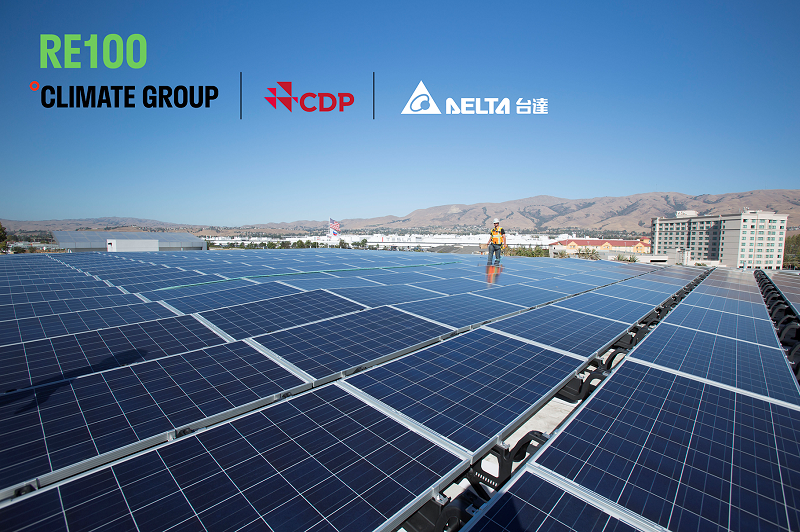Partner content
Sustainability: the driving force behind Delta’s innovation

Many companies have only now started to reflect on their impact on the environment. But for Delta Electronics, sustainability has been the driving force underpinning its business ethos and innovative solutions since it was founded over 52 years ago.
With its mission ‘to provide innovative, clean, and energy-efficient solutions for a better tomorrow,’ Delta’s responsibility to the planet, citizens and customers is front of mind for Dalip Sharma, president and general manager of Delta Electronics EMEA region, at their EMEA headquarter in the Netherlands.
As a company with a global presence and large-scale manufacturing facilities, he’s acutely aware that Delta must practice what it preaches. But is it feasible for a business to care about the environment and still turn a profit?
Sharma is adamant it is. ‘Delta is a business first and foremost. But that does not mean that we can ignore or neglect our responsibility toward society. We take this responsibility and our Environmental, Social, and Governance (ESG) goals very seriously, and we believe in turning words into positive action.’
Taking into account the effects of climate change along with the mega-trends that are driving policy and decision-making today, Delta is offering the energy-efficient solutions that the market needs.
With its industrial automation, building automation, telecom power, data centre infrastructure, EV charging, renewable energy, energy storage and display, its customers span the spectrum of industry and commerce and are nurturing the development of smart manufacturing and sustainable cities.
Continuous innovation
Turning words into positive action means developing energy-efficient solutions. To achieve that goal, Delta has invested over 8% of its annual revenues into R&D. It currently has more than 10,000 R&D engineers and 73 R&D centres around the world striving to foster innovation.
With considerable R&D resources behind it, perhaps it’s not surprising that the company’s history is a score sheet marked with patents and industry firsts. At the end of 2022, Delta’s total number of patents exceeded 15,000, mainly in the United States, mainland China, Taiwan and Europe. From 2010 to 2021, Delta’s high efficiency products have helped customers achieve electricity consumption savings totalling 35.9 billion kWh, and carbon emissions reduction of 19.01 million tonnes.
The company’s position as a pioneer has been recognised by other independent bodies. As recent as March this year, Delta was honoured for the second consecutive year as one of the Top 100 Global Innovators™ (2023) by Clarivate, the global leader in providing trusted insights and analytics. Clarivate praised the company for consistent, above-the-bar innovation performance, especially the success of its patent applications as intellectual assets in the market.
ESG responsibilities
Aside from its consistent efforts in innovation, making it one of Clarivate’s Top Global Innovators, Delta is committed to taking real action on social responsibility. Forty years ago, for example, Delta pioneered one of the world’s first energy recycling systems to reduce energy consumption in manufacturing.
In 2005, it published its first corporate social responsibility report, outlining company targets to make operations more energy efficient, and improving waste management, health and safety, governance and transparency throughout the business.
By 2021, the company’s ESG report targeted improvements in challenges like carbon management, water conservation, human rights, information security and personal data protection.

‘Another significant moment for Delta came in 2015,’ Sharma recalls. ‘We were one of the first companies to publish a climate action plan, which detailed targeted initiatives to support the Paris Agreement. This is in line with the We Mean Business Coalition and the Business Ambition for 1.5°C campaign, in which we support global efforts to achieve net zero emissions by 2050. We even include our climate change policy and information in our company reports.’
The company has also committed to a RE100 pledge to use 100% renewable electricity by 2025 for European operations, and globally by 2030. Further proof that the company believes in action and not words, is the initiative that will see EV charging stations installed at all of Delta’s major business sites by 2030, and all company cars switched to EVs.
Having assessed and evaluated the areas of business under Delta’ direct control, Sharma points to the spotlight the company is now putting on core operations that function beyond the gates of its own buildings and offices. ‘Today, we’re working very closely with supply partners, looking at how to make our supply chains more energy efficient and sustainable,’ he says.
Sharma highlights another measure the company has taken. ‘Delta also supports a marine protection group. It helps to regenerate coastal coral reef ecosystems and trains hundreds of corporate volunteers to help build coral nurseries in Taiwan.’
Innovation and sustainability will continue to be in Delta’s DNA. ‘Delta’s founder – Bruce Cheng – was acutely sensitive to the needs of the environment,’ says Sharma. ‘His long term vision of innovation and investing in promoting corporate responsibility was from the very start, and still is, one of the key drivers of our business success today.’
Thank you for donating to DutchNews.nl.
We could not provide the Dutch News service, and keep it free of charge, without the generous support of our readers. Your donations allow us to report on issues you tell us matter, and provide you with a summary of the most important Dutch news each day.
Make a donation